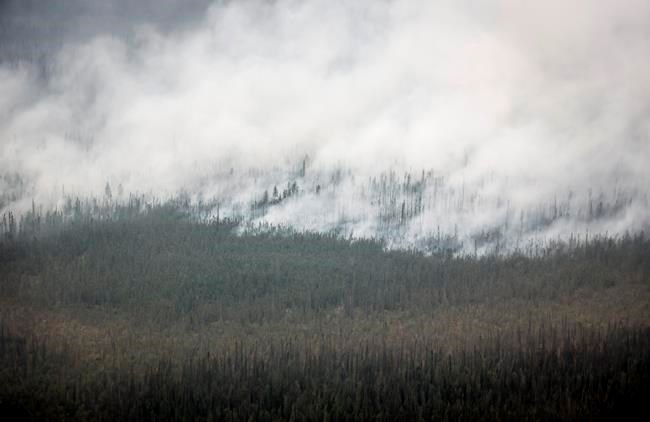A town in the Northwest Territories recently evacuated due to a raging wildfire emerged "in much better condition" than anyone could have imagined only a day earlier, when high winds and hot temperatures propelled the blaze close to its boundaries and forced fire crews and other non-essential workers to retreat, the community's mayor said Saturday.
In a statement posted online, Hay River Mayor Kandis Jameson said she and her dogs, along with soldiers and many fire support services workers, left her community on a Hercules transport plane bound for Edmonton on Friday night.
Jameson said the departure took place under "grim circumstances," but upon waking Saturday morning she said she found the town came through in much better condition than anyone expected.
"Fire crews from over a dozen other communities with our own Hay River Fire Department completed drills day after day when time permitted to be ready for last night and the days to come," Jameson said in her statement. "We thank them and their immediate local support contractors who stood their ground last night to fight for our community."
The territory's government said in an update Saturday that no structural damage was recorded in any of the most populated residential neighbourhoods in Hay River after Friday’s "blow-up event," but a cabin and a travel trailer were destroyed west of the town near the shores of Great Slave Lake. Critical infrastructure was also spared, it said.
While the update said the fire was only a kilometre-and-a-half west of the town's centre, north winds on Saturday were expected to push the fire back on itself in many areas. Generally, it said Saturday's conditions should improve visibility and limit fire growth in the direction of Hay River and the Katlodeeche First Nation.
It said that would allow aircraft to fly missions throughout the day and get crews on the line "to get good work done," but hot weather and a wind shift was forecast for Sunday which it said could cause "severe fire activity."
Prime Minister Justin Trudeau, who met with territorial Premier Caroline Cochrane in Edmonton on Saturday, said the federal government will help the territory long term with building more resilient infrastructure, supporting people living in the North and planning for climate change.
Cochrane, who voiced anger toward Ottawa on Friday over the fact the wildfire-ravaged region doesn't have the same services as the South, thanked the feds on Saturday for recent help from the military, which has provided logistical support with the wildfire fight.
"Again, we couldn't have done it without the federal government. We haven't done this before, so huge gratitude for the support the federal government's given to date," Cochrane said moments before her closed-door meeting with Trudeau.
"I'll address the infrastructure gaps later."
Trudeau said the federal government will continue to provide supports for the Northwest Territories. He noted that Cochrane was among the last evacuees out of Yellowknife and commended her for her leadership.
“You were helping people right up to the very last moment and what you are doing now in being absolutely focused on them is true to the person you are and true to the leader you are,” he said.
About two-thirds of the 45,000 people who call the N.W.T. home have left for evacuation centres, campgrounds and hotels as far south as Calgary and as far east as Winnipeg.
It has been more than a week since Yellowknife residents were ordered to leave the territorial capital, while the nearby wildfire has been kept at bay 15 kilometres from city limits.
An update from NWT Fire said temperatures were cooler on Saturday than the day before but were still above seasonal averages, keeping fire danger high for Yellowknife.
It said the fire remained 15 km away from the capital at its nearest point.
This report by The Canadian Press was first published Aug. 26, 2023.
The Canadian Press



